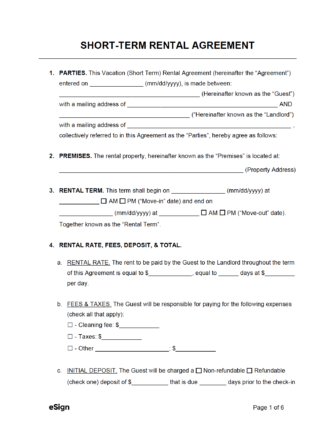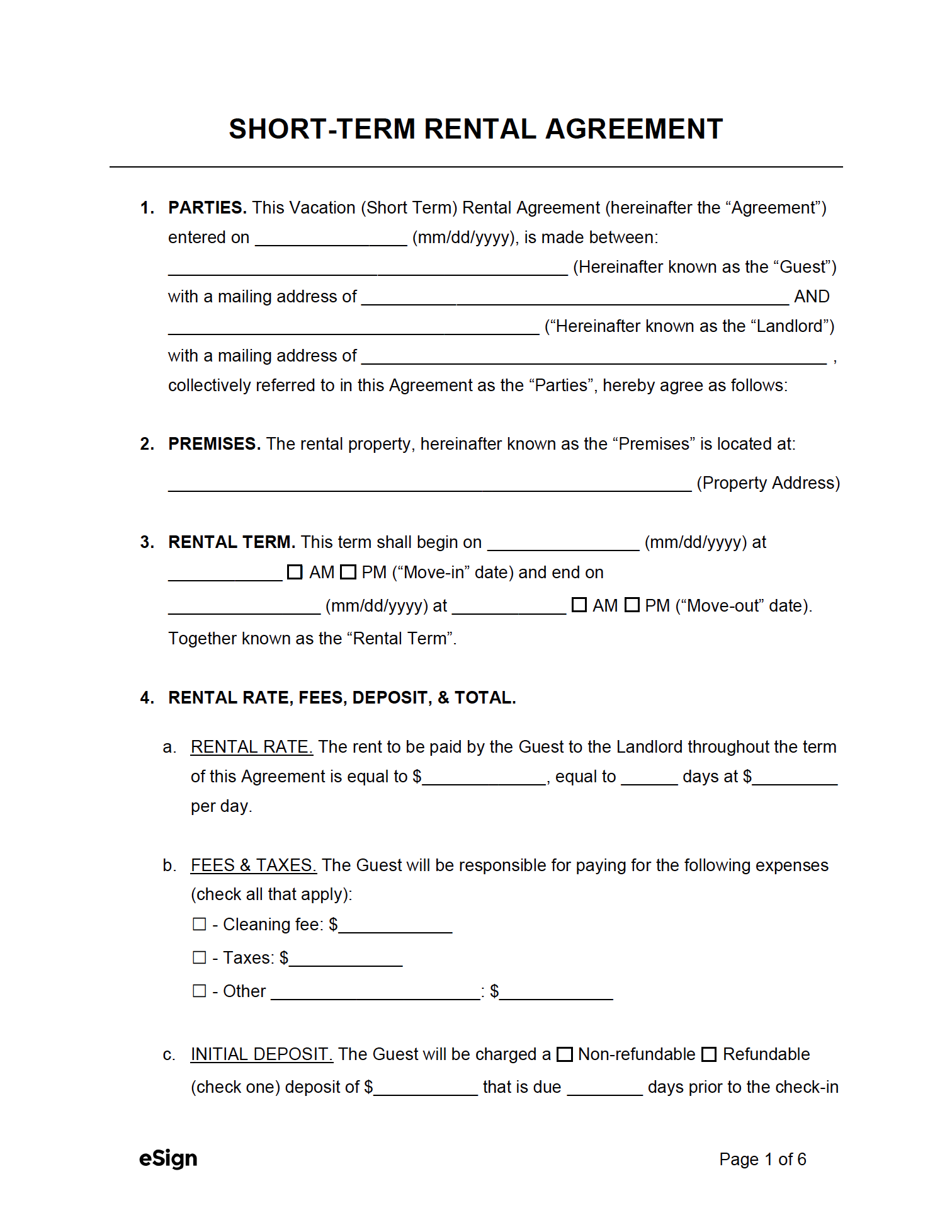
A short-term/vacation lease agreement is a contract made between a landlord and a tenant (guest) seeking to rent property for a period of less than 30 days. This is commonly for vacation, work, or any other use when a tenant rents a property for a shortened period.
A short-term/vacation lease agreement is a contract made between a landlord and a tenant (guest) seeking to rent property for a period of less than 30 days. This is commonly for vacation, work, or any other use when a tenant rents a property for a shortened period.
PDF Download
A short-term/vacation lease agreement is a contract made between a landlord and a tenant (guest) seeking to rent property for a period of less than 30 days. This is commonly for vacation, work, or any other use when a tenant rents a property for a shortened period.
4.7 | 583 Ratings Downloads: 55,376
Also known as a:
The introductory paragraph should mention the date of the agreement and the full names of both the landlord and tenant. This is to identify who this agreement is between.
To limit how many people can stay on the property during a tenant’s stay. This is to prevent parties or events, which is an issue for many landlords (and why Airbnb banned parties in 2022 [1] ).
The rent during the stay and the deposit amount. Commonly, a deposit is collected when the tenant makes the reservation, which may be before a signed agreement. Nevertheless, it should be mentioned in the agreement and other fees (cleaning, pet, etc.)
Most landlords have a strict cancellation policy, meaning, if the tenant cancels for any reason, 100% of their deposit is forfeited. However, some landlords will refund a portion of the deposit if they can re-rent the property for the same term as the canceled period.
This depends on the landlord and the tenant’s expectations. Most rules for short-term tenants include the following:
A general statement that the tenant agrees to indemnify and hold harmless the landlord for any loss, claim, damage, injury, demand, or other liability regarding renting the property.
It is also common for landlords to have homeowner’s insurance for liability purposes (such as Farmer’s Landlord Insurance).
While having this language in an agreement may not prevent a landlord’s negligence, it helps the tenant acknowledge they are responsible for any wrongdoing.
Clear instructions on how to dispose of trash and rubbish should be indicated to the tenant. For properties in metro areas, there are usually “trash days” during the week when trash is placed outside for pickup. This can also help minimize the clean-up after a tenant’s stay.
In most States, the landlord has the right to enter a rental property by providing sufficient notice to the tenant. This is commonly for maintenance or repair reasons. It is recommended to include a statement to inform the tenant that the landlord has this right (view State requirements).
Landlords don’t usually require tenants to pay for utilities but request that they use electricity with limitations. Therefore, landlords will ask the tenant to shut off air conditioners and prohibit high-consumption use, such as charging an electric vehicle.
In most States, the landlord must provide their contact information or that of a person authorized to manage the property. For best landlord-tenant relations, exchanging phone numbers is best if either party has questions.
Terms in the event a dispute should arise between the landlord and tenant should be included. A popular method is using arbitration which is faster than a court hearing, private, and often cost-effective. Ultimately, how disputes are handled is the decision of the landlord.
SHORT-TERM RENTAL AGREEMENT
1. THE PARTIES. This Short-Term Rental Agreement (“Agreement”) is made on [DATE] by and between:
Landlord: [LANDLORD’S NAME] (“Landlord”)
Mailing Address: [MAILING ADDRESS]
E-Mail: [E-MAIL]
Phone: [PHONE]
Tenant: [TENANT’S NAME(S)] (“Tenant”)
Mailing Address: [MAILING ADDRESS]
E-Mail: [E-MAIL]
Phone: [PHONE]
For good and valuable consideration, the sufficiency of which is acknowledged, the parties hereby agree as follows:
2. PROPERTY. The rental property is located at the following street address: [MAILING ADDRESS] with the following details:
Hereinafter known as the “Property.”
3. GUESTS. No more than [#] guests are allowed on the Property. The guest’s names are: (check one)
☐ – Mentioned. Guest’s name(s) are as follows: [LIST NAMES]
☐ – Not Mentioned.
The Tenant understands that they are solely liable for any actions, liabilities, or damage caused by a guest on the Property.
4. TERM. The Tenant is allowed to access and occupy the Property for the following term:
Check-In: [DATE] at [TIME]
Check-Out: [DATE] at [TIME]
5. PAYMENTS DUE. The Tenant understands and agrees to pay the following rent and deposit:
Rental Rate: $ [AMOUNT] to be paid by [DATE] .
Deposit: $ [AMOUNT] to be paid by [DATE] .
Other: [LIST OTHER FEES, TAXES, ECT.]
6. CANCELLATION POLICY. If, for any reason, the Tenant cancels this Agreement at the time or prior to check-in, the following shall apply: [DESCRIBE CANCELLATION POLICY ]
7. UTILITIES. The Parties agree that all utilities, such as heat, air conditioning, electricity, water, sewer, internet, TV, and any other services, are the responsibility of: (check one)
☐ – Landlord – The Tenant agrees to be moderate and respectful of their use of utilities.
☐ – Tenant – The Tenant shall be billed either separately (after their stay) or from the payment of their deposit for their usage of utilities.
☐ – Other. [DESCRIBE]
8. RENTAL RULES. The Tenant agrees to abide by the following rental rules: [LIST RENTAL RULES]
9. INDEMNIFICATION. The Tenant agrees to indemnify and hold harmless the Landlord from all liabilities, losses, damages, and costs, including legal fees, resulting from any actions, incidents, or accidents occurring in or caused by the Tenant’s use of the Property.
10. DISPUTES. The Tenant agrees to indemnify and hold harmless the Landlord from all liabilities, losses, damages, and costs, including legal fees, resulting from any actions, incidents, or accidents occurring in or caused by the Tenant’s use of the property.
11. GOVERNING LAW. This Agreement is governed by and construed in accordance with the laws of located in the State where the Property is located.
12. ACCESS FOR MAINTENANCE. The Tenant agrees to allow the Landlord access to the Property for any standard or agreed-upon maintenance or common upkeep of the grounds. If access is needed, the Landlord agrees to give notice to the Tenant in accordance with State law.
By signing below, the Landlord and Tenant agree to all terms and conditions of this Agreement.
Landlord: ____________________________ Date: _____________
Print Name: ____________________________
Tenant: ____________________________ Date: _____________
Print Name: ____________________________
Tenant: ____________________________ Date: _____________
Print Name: ____________________________